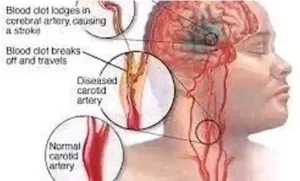If You Don’t Want To Suffer Stroke At Old Age, Avoid Excess Intake Of These three Things

Avoiding excessive intake of certain substances can indeed reduce the risk of suffering a stroke in old age. Firstly, excessive consumption of salt can elevate blood pressure, which is a significant risk factor for stroke. High salt intake can lead to hypertension, a condition that damages blood vessels over time, increasing the likelihood of a stroke. Therefore, moderating salt intake, particularly in processed and packaged foods, can help mitigate this risk.
Secondly, limiting the consumption of saturated and trans fats is crucial. These fats can raise cholesterol levels, contributing to the buildup of plaque in arteries, a condition known as atherosclerosis. When plaque ruptures, it can lead to blood clots, which may block blood flow to the brain, causing a stroke. Choosing healthier fats like those found in nuts, seeds, and fish, while reducing intake of fried and processed foods, can help lower this risk.
Lastly, excessive alcohol consumption is associated with an increased risk of stroke. Alcohol can raise blood pressure, disrupt heart rhythm, and contribute to the formation of blood clots. Moderation is key; limiting alcohol intake to recommended levels—no more than one drink per day for women and two drinks per day for men—can help reduce this risk.
In summary, to lower the risk of suffering a stroke in old age, it’s advisable to avoid excess intake of salt, saturated and trans fats, and alcohol. Instead, prioritize a balanced diet rich in fruits, vegetables, whole grains, lean proteins, and healthy fats, combined with regular exercise and maintaining a healthy weight. These lifestyle choices can significantly contribute to overall vascular health and reduce the likelihood of experiencing a stroke later in life.




